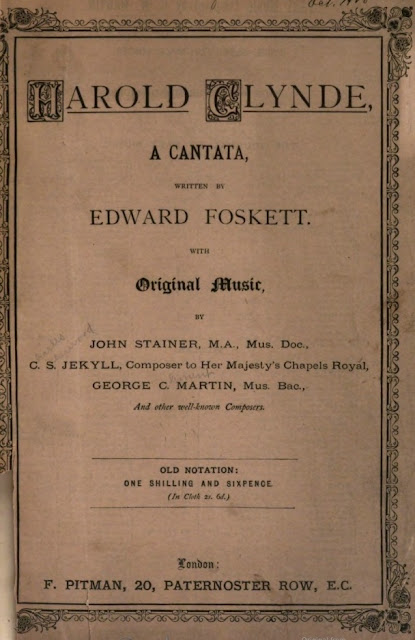While, or so it seems, all my friends and 'friends' are watching television and films, I delve. History. Musical history. And write my little pieces, in a vain attempt to stop folk using the too often ficticious articles of wikiplegia as gospel. I don't know what it's like for accuracy in other fields, but in my field it's appalling.
Anyway. I doddle on. With facts that probably interest half a dozen other people in the world ... but at least I have facts out there. Yes. Facts. That's what I deal in. Not really a care of writers these days, who prize the promotion of a theory (right or wrong) above the truth.
Oh it's not something new. And today I stumbled upon a piece of musical proselytising from the 1880s. 'Stumbled' because I was wandering down the publishing district of Paternoster Row, London City, and I encountered this strange object ...
Why would Pitman be publishing this? Did Mr Foskett (who he?) pay for it. How did said Mr Foskett get Stainer, a respectable musician, to contribute? George Martin ... why? I'm not familiar with Mr Charles S Jekyll (but I will be) ... and who were the 'other well-known composers' who were not credited on the cover, anyway ...
Well, I found the wrinkle.
Mr Foskett, a mercantile pen-pusher from Southwark, liked to write poetry. And when he moved from pushing his pen for commercial causes, he became a clerk at the National Temperance Union. And he clearly took his post to heart. For his cantata, thus labelled, and a mixture of songs and recital ... was a musical with a message ...
Needless to say, temperance organisations were delighted to have a cautionary cantata of their own and after its initial showing at the Crystal Palace Great Temperance Feast (12 July 1881), Harold Glynde was snapped up by other devoted groups. Perhaps the most unlikely performance was one at Alexandra Palace (8 October 1881) behind the Canary Exhibition and Emily Soldene in the entire Carmen.
In the few years to come, I spot performances at the Halifax Temperance Mission, at its Leicester equivalent, at Derby by the local Temperance Choir, at Chelmsford and by the Dublin Band of Hope. The Dublin group did better at their evening performance with a Musical Robinson Crusoe.
It was given at Sheffield by the Sunday School Band of Hope (1 May 1882), by the Hull Weslyan Temperance Society, at Sheffield again by the Cemetery Road Congregational Band of Hope, at Consett, Chelmsford, Chipping Norton, Aylesbury, and by Leeds's St Simon's Gospel Temperance Society. As late as 1890 it was still being given the odd hearing by the devoted ...
Mr Foskett apparently published some poetry ('Mr Foskett's poems are very serious and deliberate') as he moved on to be a librarian in Peckham ..
He died 27 September 1901 at 57 St Mary's Rd, Peckham, leaving a widow, four children, £789, and I suppose, the rights to Harold Glynde.
I wonder if this piece has been performed in the last century. I wonder if it is any good ... Musicals with a message are usually, as Julian More and Monty Norman memorably wrote in Songbook, 'for Western Union'.



1 comment:
A temperance cantata. How wierd. But then again the churches publish insane amounts of "message musicals" nowadays. Wonder what it sounded like? Thanks for your dedication.
Post a Comment